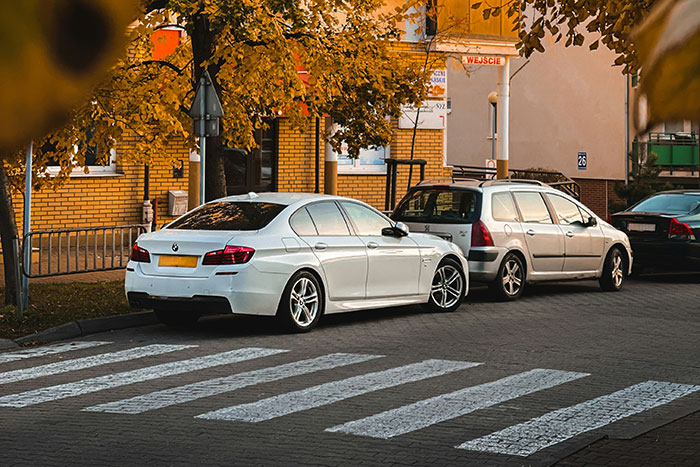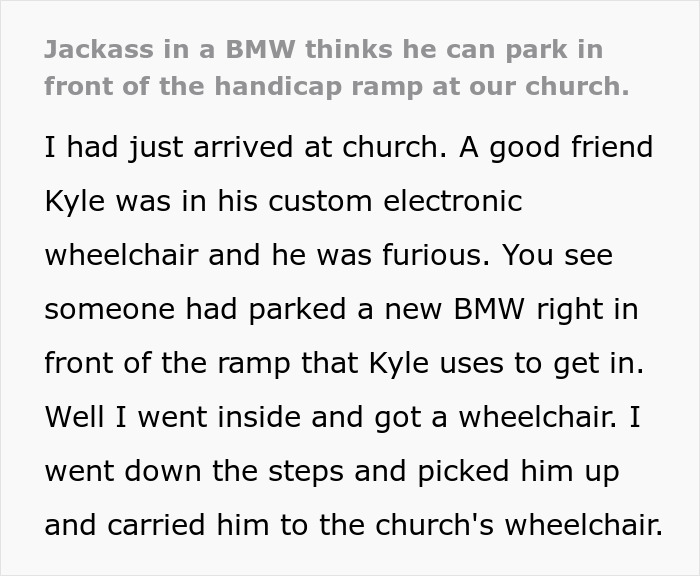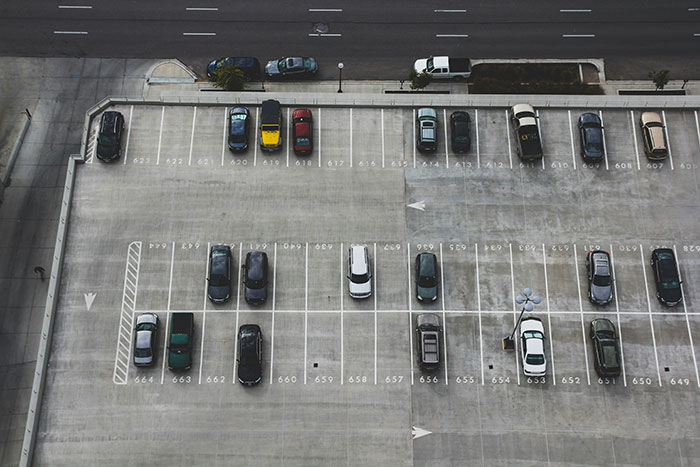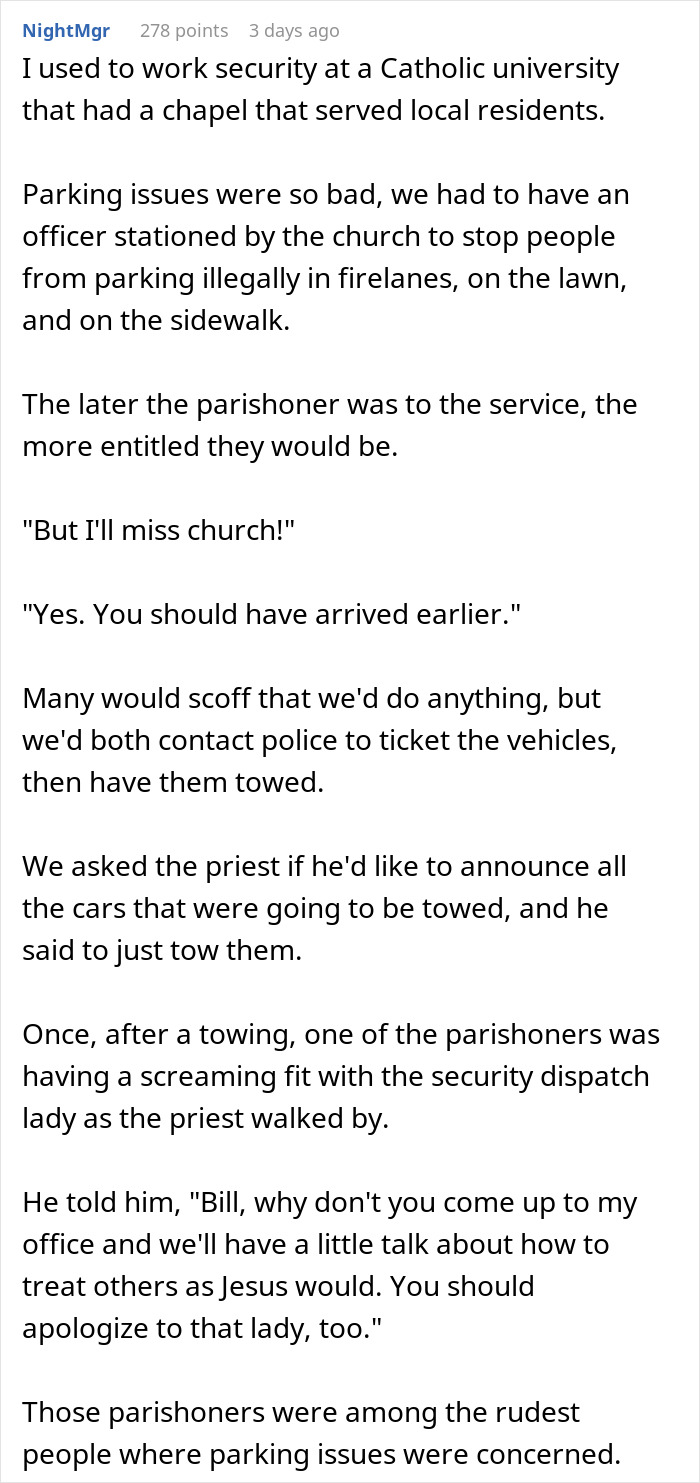Entitled people are already enough of a problem, with their demands, whining and generally delusional behavior. But in most modern, urban areas, we also have to deal with the very real fact that these folks also drive around multi-ton machines that they can just leave anywhere.
A man made sure to get revenge on a BMW driver who insisted on parking in such a way as to block a wheelchair ramp. We got in touch with Richard Layman, a urban/commercial district revitalization and transportation advocate and consultant in Washington, DC to learn more about how cars sometimes end up causing everyone issues.
Bad drivers are a hazard at the best of times

Image credits: Johnkos (not the actual image)
But one man ended up needing to get the police involved when a particularly entitled BMW driver blocked a wheelchair ramp



Image credits: Rollz International (not the actual image)


Image credits: Putrid-Chipmunk870
Professionals try to make common spaces better for everyone, with mixed results
Bored Panda got in touch with Richard Layman, a urban/commercial district revitalization and transportation advocate and consultant in Washington, DC and Salt Lake City to learn more about city planning and the impact of cars on all of us. First and foremost, we wanted to hear, as a city planner, what misconceptions he keeps encountering.
“The biggest misconception is that planners have agency. They don’t. The elected officials call the shots. Planners advise but don’t make policy. And elected officials often do not listen. I am embarrassed for all the times I pointed at a planner and said “you should do this.” People need to focus on lobbying elected officials. I recommend people read “city as a growth machine” to understand how it really works.”
He also had a few explanations for why this might happen more often than not. “We are a capitalist society, people resent developers and their profits and think land use approvals should be more socialistic. But mostly they are against it. Sometimes that’s good because it can scuttle bad proposals. Sometimes good or at least better projects are scuttled too, because of time added to the process and unexpected changes in conditions (recession, financing). People don’t understand scenario planning and can’t imagine there can be worse outcomes–like a Walmart for 60 years instead of 440 apartments with ground floor retail. Or an empty grocery store because people fought housing above,” he shared.

Image credits: John Matychuk (not the actual image)
He went into detail with some of the macro level issues
“Planning is usually sequential when the equivalent of “plan approve” (like design build) should be done. The process of proposal approval means there is no room for integrated solutions. Planners give input in early phases, but they are not inclined to be innovative. Citizens pretty much only input in hearings, when things are already set,” he shared with Bored Panda. Unfortunately, this can mean that folks with disabilities might get left behind if they aren’t able to make their concerns heard.
“An example would be a transit station site in DC. It should have integrated parking to support the commercial district plus the proposed housing, and there should be a wee bit of retail, very specific to be successful. But it is a transit agency, then a developer, then a project approved by the city. With zero inflection points to be innovative. I argue all planning engagements are set up to fail because planners are responsible for both city wide and neighborhood goals, but residents only take responsibility for the latter. Plus this contradiction is never discussed or addressed.” Sometimes residents can take matters into their own hands, but only on “simple” things like folks parked in the wrong place.
“Rarely is there adequate education built into planning engagements. It’s rare that people become more knowledgeable and better at participating with each engagement they participate in. That’s pretty damning (although I am an exception). People expect things to be fast. 2 projects in DC I participated in took 13 years. Another, the Metrorail site, is in its 24th year although groundbreaking is likely this year or next. My joke is I finally learned patience in my 40s when I realized a fast tracked transportation project takes 10 years. As a board member of a park we’re planning projects now that maybe will be finished by 2030.”

Image credits: Stockholm Paris Studio (not the actual image)
This leads to the issue of cars, as one can’t exactly regulate “entitled people”
“All cars are engineered to go very fast. All roads, regardless of land use context, are built to enable fast driving. I argue we should have differentiated pavements around parks, libraries, schools, transit stations etc. to make speed and land use context more congruent.
This particular story is a good example of some of the difficulties one can run into. This church is probably attended by hundreds of people, most of them driving, given that it’s in the US. The building sets a ramp for disabled folks and there is no doubt a sign telling drivers to not park there. Similarly, there are laws against this. But all this regulatory power suffers in comparison to one entitled fellow and his BMW.

Image credits: JESHOOTS.com (not the actual image)
Readers thought the man’s actions were hilarious


















